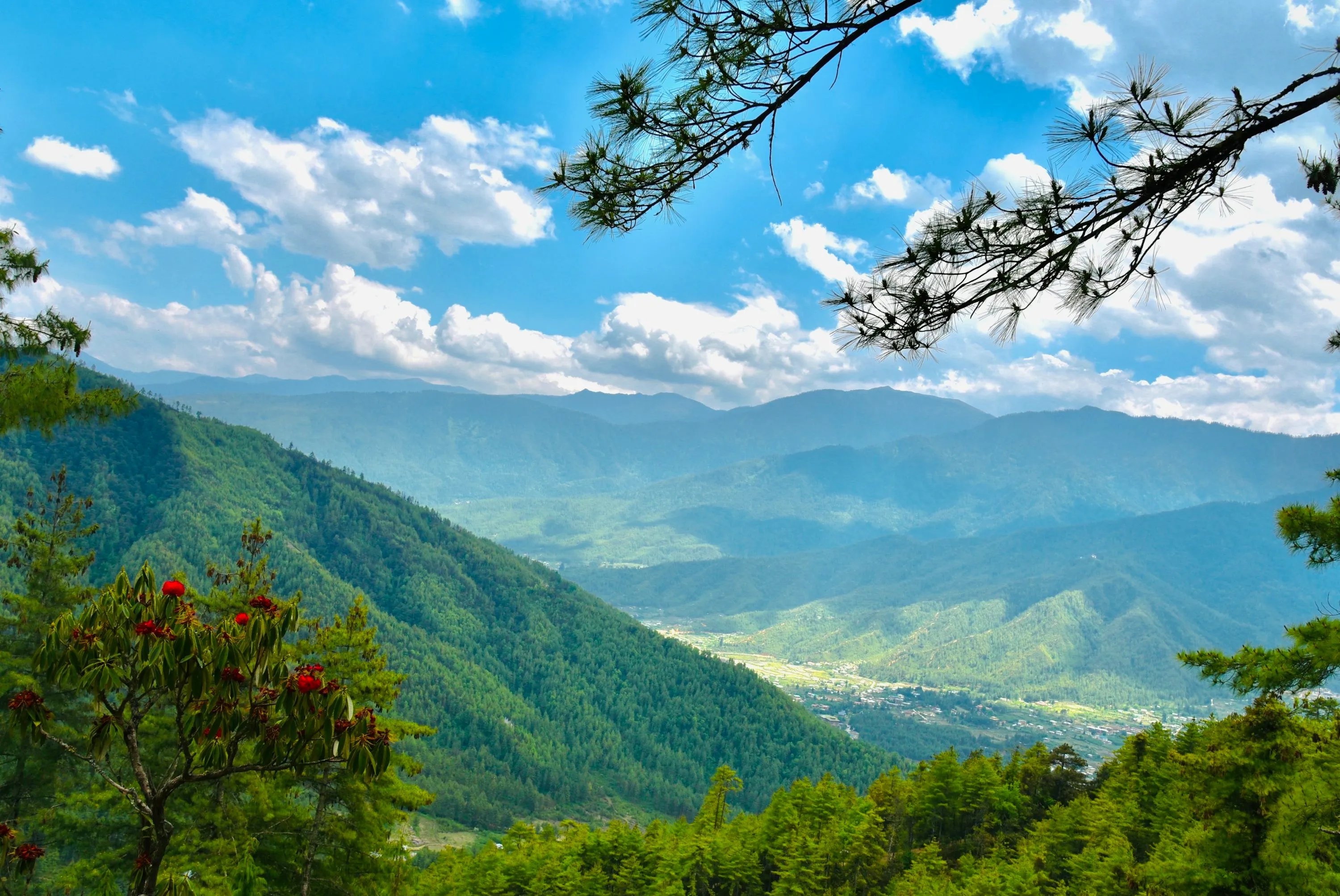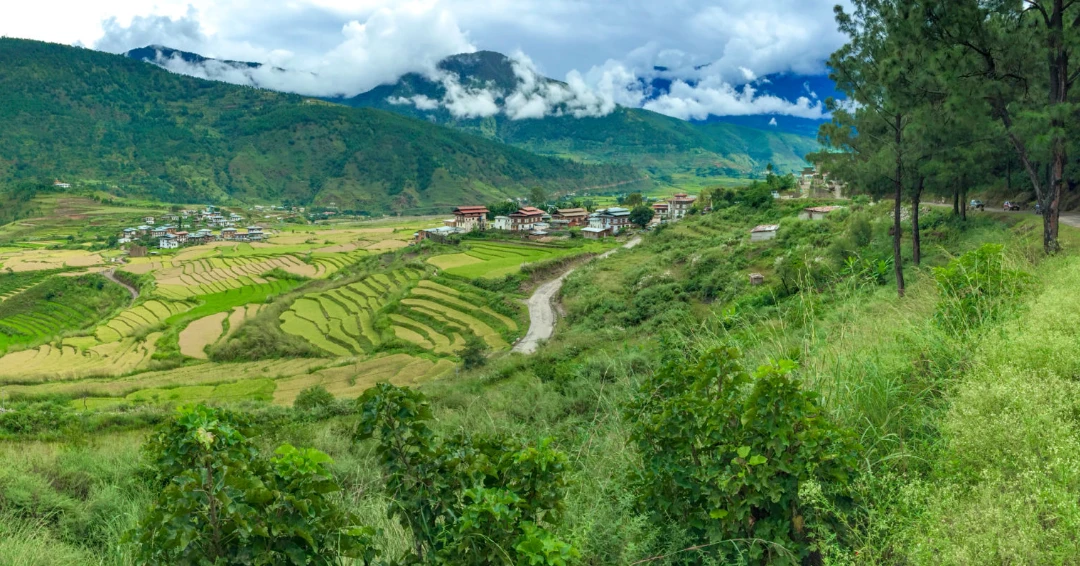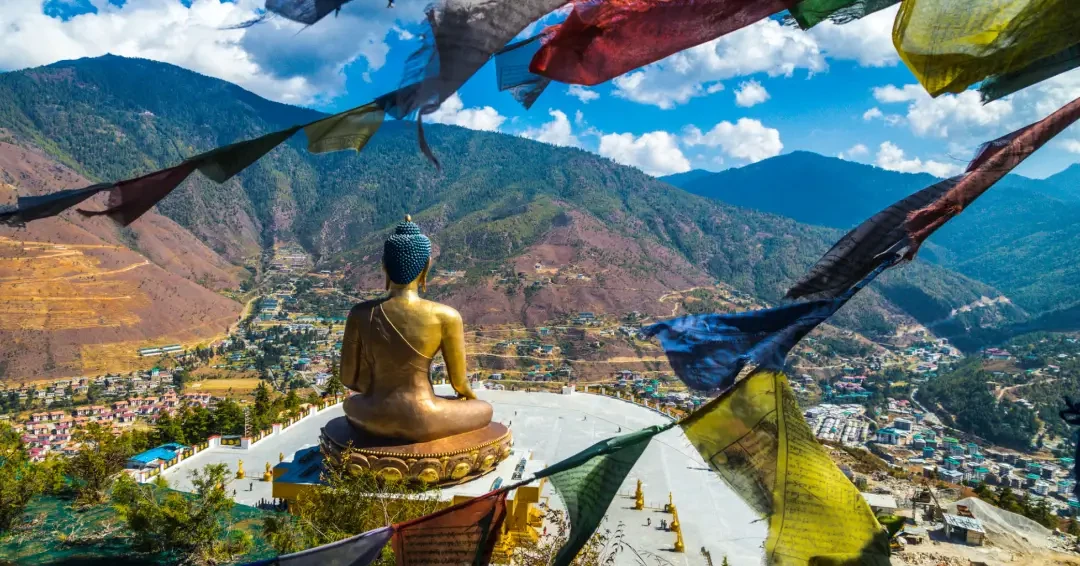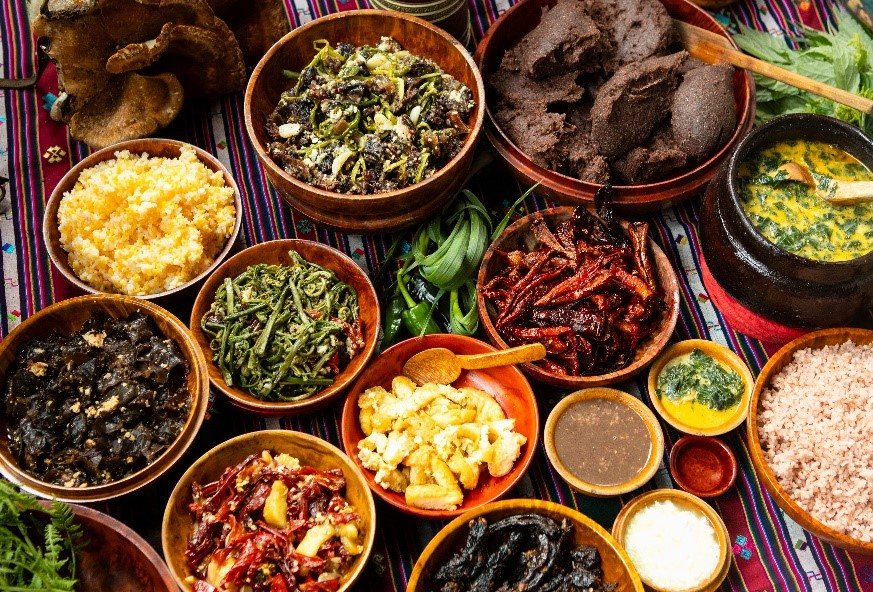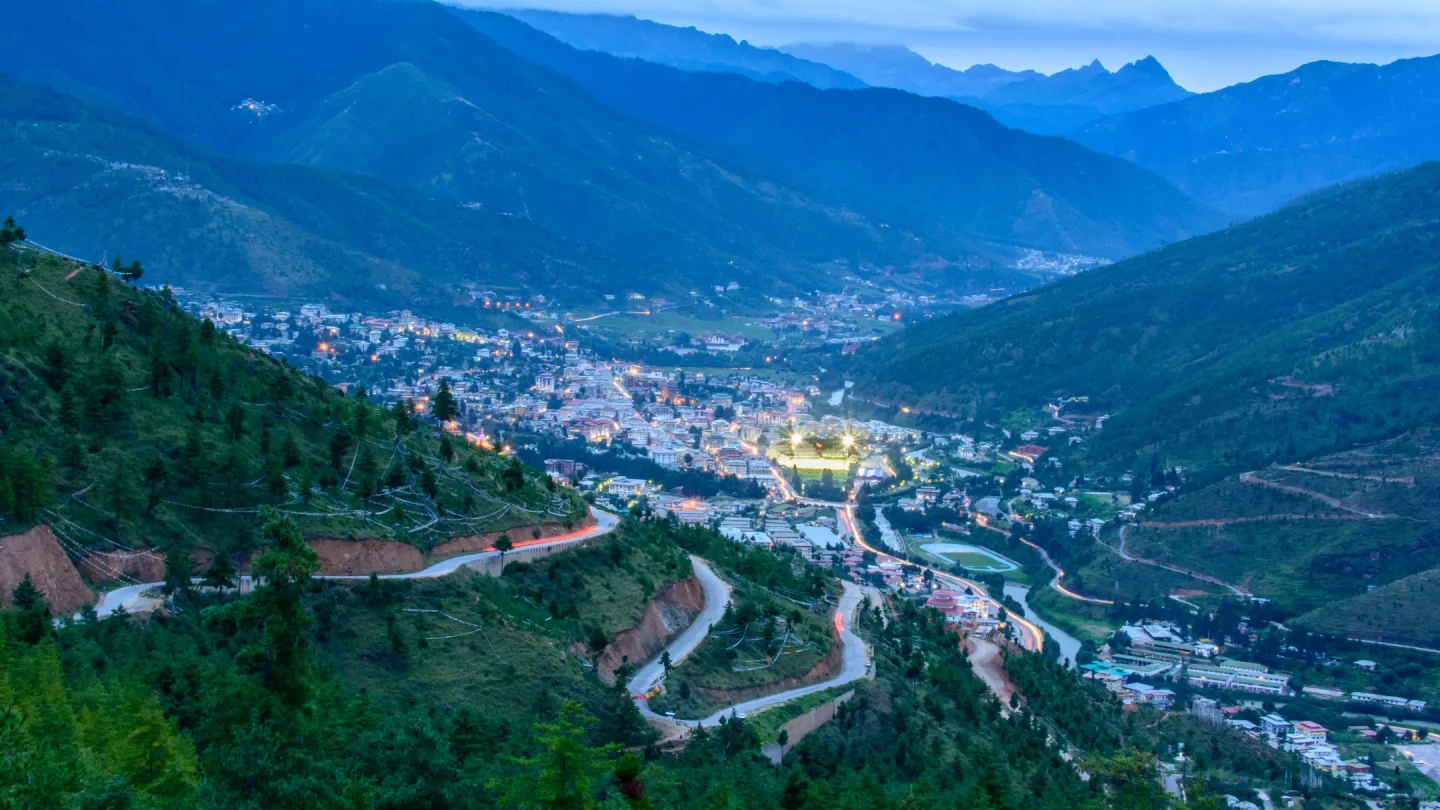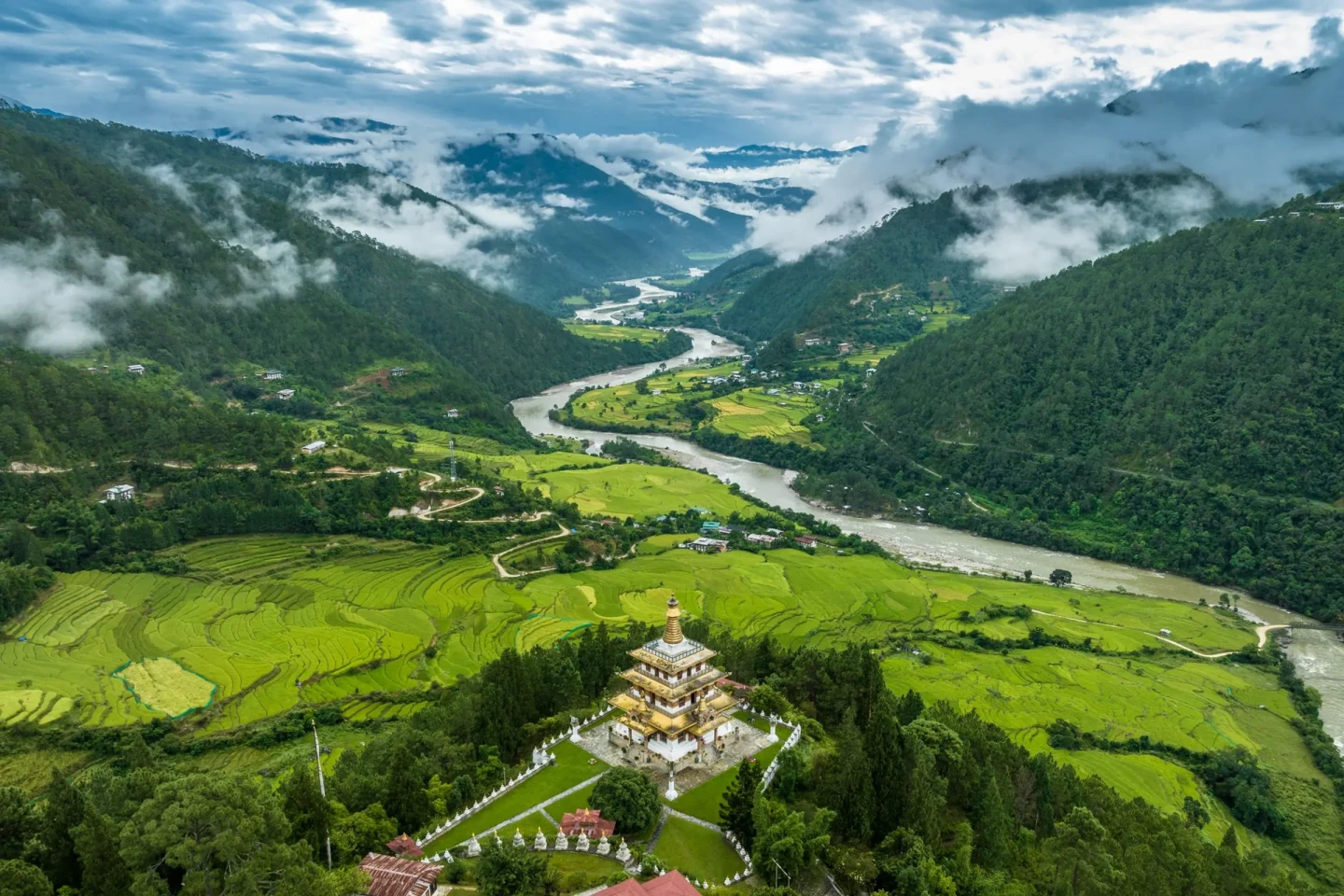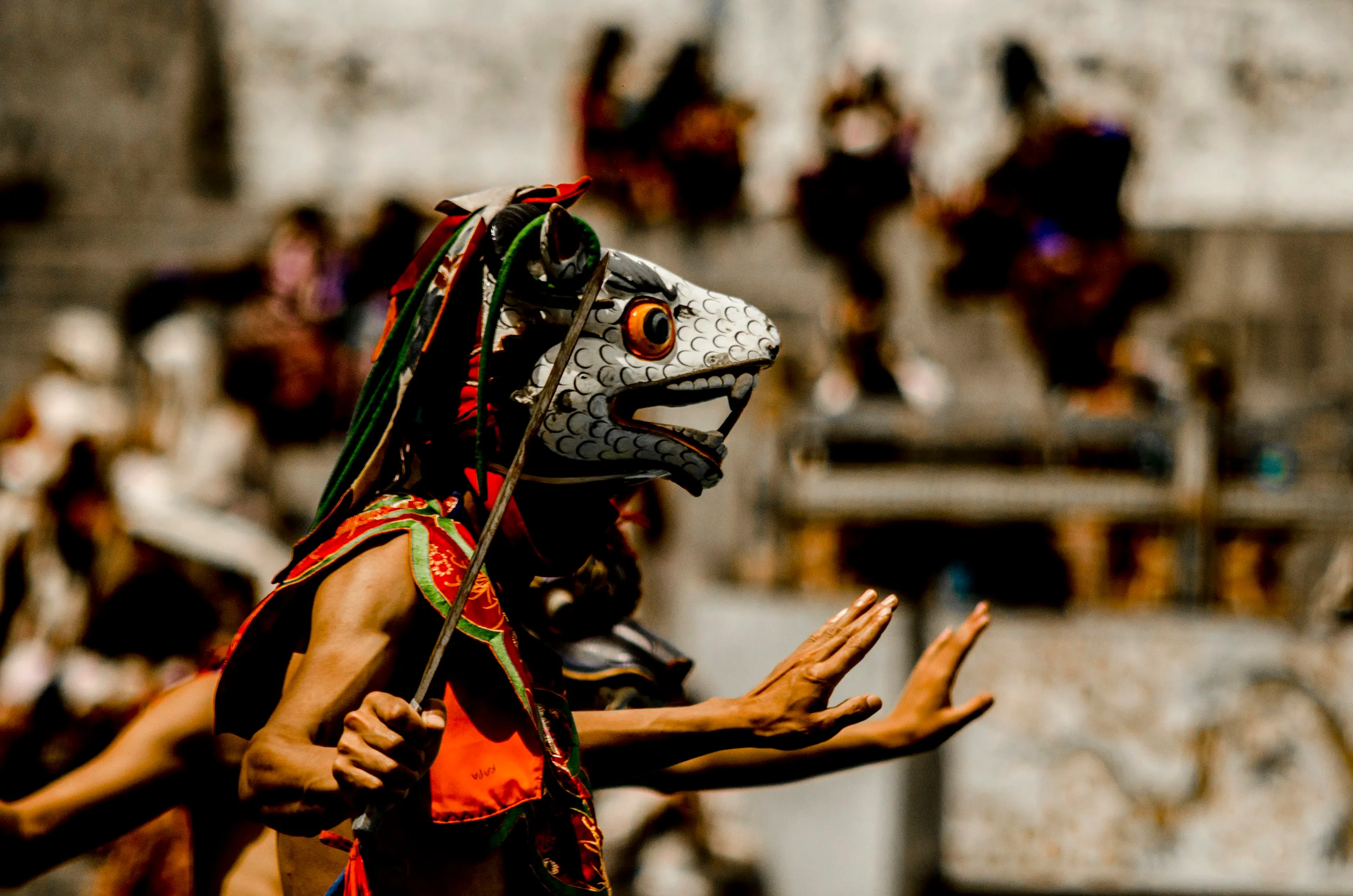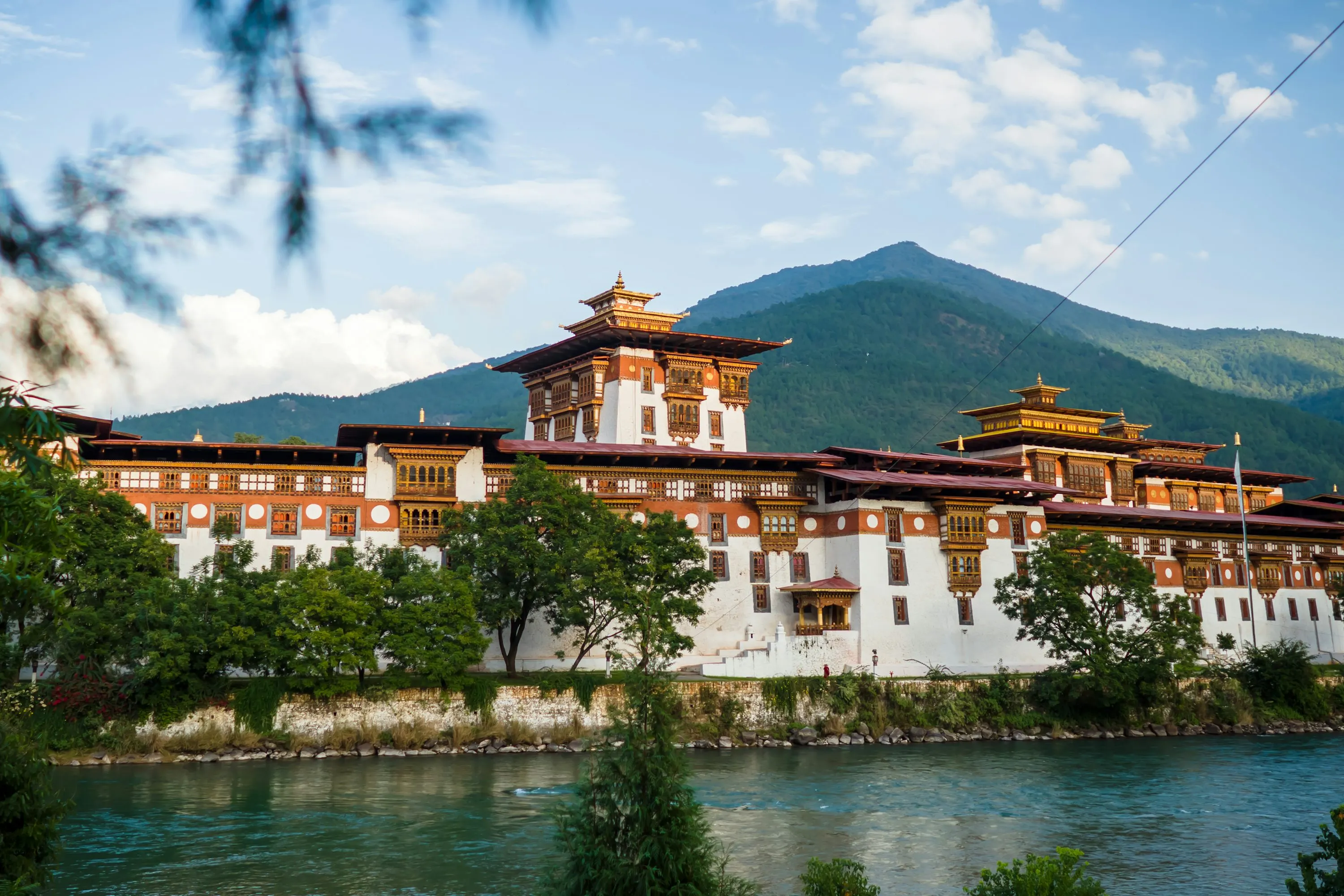Nestled in the eastern Himalayas, Bhutan emerges as a serene and enchanting destination that captivates the soul with its pristine landscapes, ancient monasteries, and profound commitment to happiness and sustainability. For Iraqi travelers, who are accustomed to the vast deserts, historic river valleys, and vibrant cultural tapestry of the Middle East, Bhutan offers a striking contrast—a landlocked kingdom where snow-capped mountains replace arid plains, and Buddhist traditions weave through daily life much like the rich Islamic heritage shapes Iraqi society. While Iraq boasts ancient civilizations along the Tigris and Euphrates, Bhutan preserves its own timeless customs amid rugged terrain, emphasizing spiritual harmony over material progress. Diplomatic relations between Iraq and Bhutan are minimal, with no direct embassies, reflecting Bhutan's selective international engagements focused on mutual respect and non-interference, yet this does not hinder the warm welcome extended to visitors from afar. What makes Bhutan compelling is its authenticity; it is not a mass-tourism hub but a carefully guarded paradise where Gross National Happiness guides policy, ensuring that every journey contributes to cultural preservation and environmental stewardship. Iraqi adventurers seeking respite from urban bustle will find Bhutan realistic in its challenges—such as winding roads and variable weather—but profoundly rewarding in its opportunities for introspection, natural beauty, and genuine human connections, making it an ideal escape for those yearning for depth beyond superficial travel.
Visa and Entry Requirements
Bhutan's tourism is governed by a high-value, low-impact policy designed to protect its environment and culture, requiring all foreign visitors, including those from Iraq, to book their trips through licensed Bhutanese tour operators. This controlled approach ensures that tourism remains sustainable and benefits local communities directly. For Iraqi tourists, the visa process begins with selecting a reputable tour operator who will handle the application on your behalf; you cannot apply independently at a Bhutanese embassy, as there is no Bhutanese diplomatic mission in Iraq. Required documents typically include a valid passport with at least six months' validity from the date of entry, a recent passport-sized photo, and proof of onward travel, along with details of your itinerary and accommodations arranged by the operator. The tour operator submits these to the Tourism Council of Bhutan, which processes the visa clearance letter, usually within 72 hours once full payment for the tour is received. Payment is intrinsically linked to visa approval, as the daily tariff must be wired in advance to secure your entry permit. A key component of this is the Sustainable Development Fee (SDF), currently set at US$100 per night for non-SAARC visitors like Iraqis, which funds education, healthcare, and environmental initiatives in Bhutan. This fee is included in the minimum daily package rate, impacting overall pricing by covering essentials like accommodations, meals, and guides, while promoting equitable development. Upon approval, the visa is stamped on arrival at Paro International Airport or land borders, valid for the duration of your booked tour. It's essential to plan ahead, as spontaneous travel is not permitted, and extensions require operator assistance, ensuring your visit aligns with Bhutan's ethos of mindful tourism.
Travel Routes from Iraq to Bhutan
Reaching Bhutan from Iraq involves careful planning due to the absence of direct flights, necessitating transits through major hubs that connect the Middle East to South Asia. From key Iraqi cities like Baghdad, Erbil, or Basra, travelers typically fly with airlines such as Qatar Airways, Emirates, or Turkish Airlines to intermediate points like Delhi in India, Bangkok in Thailand, or Kathmandu in Nepal, before connecting to Bhutan's Paro International Airport. For instance, a common route from Baghdad might involve a flight to Delhi via Doha or Dubai, followed by a transfer to Drukair (Bhutan's national carrier) or Bhutan Airlines, the only two airlines authorized to operate into Paro. These Bhutanese airlines fly limited schedules from select cities—Drukair offers routes from Delhi, Bangkok, Kathmandu, and others, while Bhutan Airlines focuses on similar connections but with fewer frequencies. Paro Airport, perched at 2,235 meters amid steep valleys, is one of the world's most challenging landing sites, with operations restricted to daylight hours and highly skilled pilots certified for its unique approach; this can lead to weather-related delays, especially during monsoon seasons when fog or rain disrupts visibility. Expect total travel times of 15 to 25 hours, including layovers, and book flights well in advance through your tour operator, who coordinates seamless connections. Realistic expectations include potential overnight stops in transit cities due to mismatched schedules, and it's advisable to confirm baggage allowances, as Bhutanese flights have stricter limits. While land entry via India is possible from Phuentsholing or Samdrup Jongkhar, air travel remains the most practical for Iraqi visitors, offering stunning aerial views of the Himalayas upon descent into Paro.
Best Time to Visit and Seasonality
Bhutan's climate is diverse, influenced by its Himalayan topography, creating four distinct seasons that profoundly shape travel experiences and require thoughtful planning for Iraqi tourists unaccustomed to such variability. Spring, from March to May, brings mild temperatures averaging 10-20°C in valleys, with blooming rhododendrons and clear skies ideal for trekking and sightseeing, though occasional showers can occur; this period aligns with festivals like Paro Tshechu, offering cultural immersion amid vibrant flora. Summer, June to August, introduces the monsoon, with heavy rainfall up to 500mm monthly in lower regions, leading to lush greenery but muddy roads, landslides, and leech-infested trails—less favorable for outdoor activities, yet perfect for those seeking quieter visits to indoor sites like museums. Autumn, September to November, is widely regarded as the prime season, featuring crisp air at 5-15°C, harvest festivals such as Thimphu Tshechu, and excellent visibility for mountain views, balancing comfortable weather with moderate crowds. Winter, December to February, drops temperatures to sub-zero in higher altitudes, with snowfall enhancing scenic beauty for hardy travelers interested in low-season tranquility and events like Punakha Tshechu, though cold snaps demand warm gear. For Iraqi visitors, accustomed to hot, dry summers and mild winters, autumn or spring are recommended to avoid extremes, providing optimal conditions for activities like hiking Tiger's Nest or exploring dzongs, with fewer tourists than peak times and festivals adding cultural depth. Seasonality affects pricing and availability, so aligning your trip with personal preferences—whether nature, festivals, or solitude—ensures a fulfilling journey.
Money, Costs, and Payment Methods
Bhutan's currency, the Ngultrum (BTN), is pegged to the Indian Rupee at par value, facilitating easy exchanges for Iraqi travelers who might carry US dollars as a stable alternative. Currency exchange is available at Paro Airport, banks in major towns like Thimphu and Paro, and authorized hotels, but rates favor crisp, high-denomination USD bills; avoid torn notes, as they may be rejected. ATMs are increasingly common in urban areas, operated by banks like Bhutan National Bank or Bank of Bhutan, accepting international cards like Visa and Mastercard, though rural spots lack them, so withdraw cash in advance. Credit card acceptance is limited to upscale hotels, souvenir shops, and some restaurants in cities, often with surcharges, making cash essential for local markets and tips. Iraqi visitors should carry a mix of USD for exchanges and small BTN denominations for daily use, as the SDF-inclusive tour package covers major costs like accommodations, meals, transport, and guides. Typically, the minimum daily tariff—around US$250 in high season—encompasses three-star lodging, three meals daily (often buffet-style Bhutanese cuisine), private vehicle with driver, and an English-speaking guide, promoting all-inclusive convenience. Extra expenses include alcoholic beverages beyond basic offerings, personal shopping, optional activities like hot stone baths, and gratuities for guides (US$10-15 per day suggested). Budget realistically for US$50-100 daily in extras, depending on habits, and note that bargaining is uncommon except in informal markets, ensuring transparent pricing aligned with Bhutan's ethical tourism.
Health, Safety, and Travel Insurance
Health considerations in Bhutan revolve around its high-altitude terrain, where elevations from 150 meters in the south to over 7,000 meters pose risks like acute mountain sickness, characterized by headaches, nausea, and fatigue, particularly for Iraqi travelers from lower altitudes. Preventive measures include gradual acclimatization, staying hydrated, and avoiding alcohol initially; medical facilities are basic, with well-equipped hospitals in Thimphu and Paro, but remote areas rely on clinics, necessitating comprehensive travel insurance covering emergency evacuation by helicopter, which can cost thousands. Recommended vaccinations include hepatitis A, typhoid, and tetanus, as food and water-borne illnesses are possible, though tour operators ensure safe dining; rabies shots are advisable due to stray dogs. Bhutan is remarkably safe, with low crime rates stemming from its Buddhist values and close-knit communities, but petty theft in tourist spots and hazards like uneven paths or wildlife encounters warrant caution. Iraqi visitors should secure insurance with medical, trip cancellation, and repatriation coverage, as standard policies may exclude high-altitude activities. Overall, Bhutan's peaceful environment fosters worry-free exploration, but preparedness for natural elements like slippery trails during rains enhances safety.
Cultural Etiquette and Social Expectations
Bhutanese society is deeply rooted in Buddhist principles of respect, humility, and harmony, requiring Iraqi travelers to adapt modestly to ensure meaningful interactions and avoid unintended offenses. In temples and monasteries, remove hats, shoes, and sunglasses upon entry, dress conservatively with long pants and sleeves covering shoulders, and refrain from pointing at statues or people—use an open palm instead. Photography inside sacred spaces is prohibited, and always circumambulate religious structures clockwise, embodying reverence for the spiritual essence that permeates daily life. Socially, Bhutanese value patience and quiet demeanor; loud voices or aggressive gestures, common in some Middle Eastern negotiations, should be tempered to match the calm, non-confrontational style here. Greet with "Kuzuzangpo la" (hello) and accept offerings like tea with both hands, symbolizing gratitude. Modesty extends to public behavior—avoid public displays of affection, and women should cover legs and arms in villages. Iraqi cultural traits like hospitality align well, but adjustments such as embracing vegetarian meals during religious periods or yielding to elders foster deeper connections. By embodying humility, visitors honor Bhutan's ethos, turning potential cultural gaps into bridges of mutual understanding.
Connectivity, SIM Cards, Internet Access
Connectivity in Bhutan has improved significantly, yet remains variable, demanding realistic expectations from Iraqi travelers reliant on digital communication. Wi-Fi is reliably available in most hotels and cafes in urban areas like Thimphu and Paro, often free but slower in remote valleys due to mountainous terrain hindering signals. For mobile access, purchase a local SIM from providers like B-Mobile (Bhutan Telecom) or TashiCell at the airport or town outlets; they offer affordable tourist packages with data, calls, and texts, requiring your passport for registration. B-Mobile boasts wider coverage, ideal for treks, while TashiCell provides competitive urban speeds. Iraqi apps may face no restrictions, but occasional censorship of sensitive content occurs, making VPNs useful for unrestricted access—download one before arrival. Expect spotty 4G in highlands, and plan offline activities; your guide can assist with SIM setup, ensuring you stay connected for essentials like family updates or navigation, while embracing occasional disconnects as part of Bhutan's tranquil appeal.
Language and Communication
Dzongkha serves as Bhutan's national language, a Tibeto-Burman tongue spoken in daily life, but English prevails in tourism, education, and government, easing barriers for Iraqi visitors with varying proficiency. Tour guides are fluent in English, trained to interpret cultural nuances, though Arabic-speaking guides are rare and must be requested in advance through operators, potentially at extra cost. In rural areas, English is less common among elders, relying on gestures or guide mediation. For limited-English speakers, learn basic Dzongkha phrases like "thank you" (kadinche la) via apps, use translation tools, or carry phrasebooks; visual aids like pictures help in markets. Bhutanese are patient communicators, valuing non-verbal cues, so smile and listen actively to build rapport. This blend encourages immersive experiences, where language gaps highlight universal human connections.
Packing and Preparation Advice
Packing for Bhutan demands versatility to handle its Himalayan climate, from warm subtropical lowlands to chilly high passes, advising Iraqi travelers to prioritize layers and practicality. Essential clothing includes breathable long-sleeved shirts, modest pants or skirts for cultural sites, a waterproof jacket for monsoons, thermal underlayers for winters reaching -5°C, and sturdy hiking boots for trails like Tiger's Nest. Pack a hat, gloves, and scarf for altitude cold, plus sunscreen and sunglasses for UV exposure. Personal items should encompass reusable water bottles for hydration, insect repellent against leeches in summers, and a first-aid kit with altitude meds like Diamox, pain relievers, and bandages. Medications for common ailments—diarrhea, allergies—are crucial, as pharmacies are limited; bring prescriptions. Power adapters for type D, M, or G plugs (230V) are needed, along with portable chargers for outages. Other considerations: binoculars for wildlife, a journal for reflections, and eco-friendly toiletries, ensuring light luggage under 20kg for flights. Prepare by consulting your doctor on vaccinations and fitness for altitudes, blending comfort with respect for Bhutan's environment.
Bhutan’s Unique Tourism Philosophy
At the heart of Bhutan's tourism lies the philosophy of Gross National Happiness (GNH), a holistic framework prioritizing collective well-being over economic growth, shaping policies that limit visitor numbers and promote quality experiences. Introduced by the Fourth King in the 1970s, GNH encompasses psychological wellness, cultural preservation, environmental sustainability, and good governance, ensuring tourism enhances rather than erodes these pillars. For Iraqi travelers, this means mandatory guided tours and the SDF, which fund community projects, reflecting Bhutan's caution against unchecked modernization that could dilute its identity. By preferring discerning visitors who appreciate depth, Bhutan avoids overtourism's pitfalls, preserving forests covering 70% of the land and traditions like archery festivals. This approach stems from a desire to maintain sovereignty and happiness, viewing mass development as a threat to spiritual harmony, inviting guests to engage meaningfully and leave with enriched perspectives.
Mindset and Expectations for Visitors
Approaching Bhutan requires a mindset attuned to its deliberate pace and simplicity, where the absence of bustling nightlife or luxury malls underscores a focus on nature, culture, and introspection—elements that may surprise Iraqi travelers expecting modern conveniences. Life unfolds slowly, with meals lingering over conversations and itineraries flexible to weather, fostering patience as a virtue amid limited infrastructure like winding single-lane roads. Accommodations are cozy family-run hotels or guesthouses, emphasizing comfort over opulence, with hot water and Wi-Fi not always guaranteed in remotes. Expect no high-end shopping or casinos; instead, embrace artisan markets and serene evenings stargazing. This emphasis on spirituality—through monastery visits and mindful treks—rewards those seeking inner peace, reframing potential inconveniences as opportunities for growth, aligning with Bhutan's GNH to deliver profound, unhurried fulfillment.
Food and Dining Culture
Bhutanese cuisine reflects the kingdom's agrarian roots and Himalayan influences, featuring bold, spicy flavors from chilies, cheese, and simple staples that embody hospitality and communal sharing. Signature dishes like ema datshi—a fiery chili-cheese stew—dominate meals, paired with red rice, buckwheat pancakes (khur-le), or momos (dumplings), often vegetarian due to Buddhist principles, though pork or beef variants exist. Dining is unhurried, with family-style servings encouraging bonds; tea, especially suja (butter tea) for warmth or ngaja (sweet milk tea), punctuates social interactions. Alcohol like ara (rice wine) features in toasts, but moderation prevails. For Iraqi palates accustomed to flavorful meats and breads, adjustments to spiciness are key, yet the warmth of hosts—offering seconds generously—mirrors Middle Eastern generosity, turning meals into cultural exchanges.
Festivals, Religion, and Sacred Places
Religion permeates Bhutanese life through Vajrayana Buddhism, where festivals (tshechus) honor Guru Rinpoche with masked dances, music, and rituals at dzongs, fostering community and spiritual renewal. Attendees witness cham dances depicting moral tales, clad in finery, but must observe rules: modest dress, no photography inside, and clockwise movement. Sacred sites like Taktsang Monastery demand reverence—remove shoes, maintain silence, and accept blessings humbly. These experiences deepen understanding of Bhutan's devotion, blending joy with piety to reveal a society where faith guides harmony.
Hidden Challenges and Practical Inconveniences
Bhutan's allure includes subtle challenges that test patience, viewed as integral to its authentic charm rather than flaws. Road conditions—narrow, winding paths prone to landslides during monsoons—may delay journeys, requiring flexible mindsets. Power outages occur sporadically, especially in rural areas, adding rustic appeal to candlelit evenings. Service can be leisurely, reflecting a non-rushed culture, while itinerary changes due to weather embody adaptability. Embracing these with humor transforms them into memorable anecdotes, enhancing appreciation for Bhutan's unpolished beauty.
Shopping and Souvenirs
Shopping in Bhutan centers on artisanal treasures like handwoven textiles (kira and gho fabrics), bamboo crafts, and incense, found in Thimphu's weekend market or Paro's shops, sans malls or duty-free extravagance. Bargaining is mild in local stalls but absent in government emporiums ensuring fair prices and authenticity. Seek certified goods to support artisans, framing purchases as cultural mementos.
Altitude Awareness and Physical Preparedness
Bhutan's altitudes, averaging 2,000-4,000 meters, affect visitors variably, with symptoms like dizziness or shortness of breath emerging above 2,500 meters. Precautions include ascending gradually, hydrating (3-4 liters daily), and resting; avoid overexertion. Acclimatization days in Paro help, and consult doctors for pre-existing conditions, turning awareness into safe enjoyment.
Security, Safety, and Emergency Information
Bhutan's security is exemplary, with negligible crime and stable politics, but respect laws against tobacco sales or defaming royalty. Emergencies dial 112 for police/ambulance; Iraqi consular aid via India's embassy in Thimphu, as no direct mission exists. Guides handle crises, reinforcing safety through vigilance on trails.
Photography and Drones
Photography in Bhutan captures its splendor, but rules prohibit it inside religious sites or government buildings; seek permission for locals. Drones are banned for tourists without permits, respecting privacy and security.
What Bhutan Does Not Have
Bhutan lacks skyscrapers, fast-food chains, casinos, and mega-malls, preserving its skyline and culture, which enhances its charm as a haven of simplicity.
Important Questions to Ask Before Booking a Tour
Before committing to a Bhutanese tour operator, Iraqi travelers should inquire about the guide's qualifications and language skills, ensuring they are licensed and fluent in English, or if Arabic support can be arranged for clearer communication during cultural explanations. It's wise to ask about accommodation standards, such as whether hotels offer halal options or private baths, and how flexible the itinerary is for personal preferences like additional rest days. Regarding food, discuss dietary accommodations for spicy Bhutanese cuisine, including vegetarian alternatives or adjustments for health needs, and clarify what's included in meals. For emergencies, probe the operator's protocols, like access to medical facilities, evacuation plans, and 24/7 support, plus insurance recommendations. Question SIM card provision upon arrival for connectivity, tipping customs (typically US$10-15 daily for guides), and how language barriers are handled in remote areas. These conversational queries ensure a tailored, secure experience.
Conclusion
In reflection, Bhutan stands as a rare gem for Iraqi travelers, offering a sanctuary of cultural depth, breathtaking nature, and spiritual serenity that contrasts yet complements the rich heritage of Iraq. By choosing this destination, you embark on a journey that transcends typical vacations, inviting profound personal growth amid a world unmarred by commercialization, where happiness is measured in moments of quiet wonder rather than fleeting thrills.




